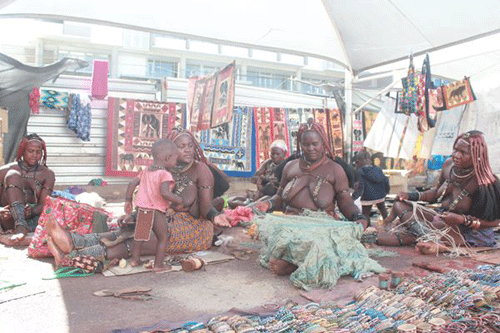Paheja Siririka
Six ladies selling handmade jewellery at the OK parking lot at city-centre said they rely on arts to make a living, a sort of solitude they resort but due to Covid-19 and the usual hardship they endure, business has not been gloomy for the past year and the ‘neglect’ from government hasn’t made it easier.
Entertainment Now! had a chat with them to find out, according to them, the status of arts in the country and suggested interventions relevant authorities should embark on to take the country to greater heights in terms of arts.
Kasoto Muheke makes and sells bracelets and dolls, something she has been doing for the past 20 years. “We are six here who have been selling things here; I have been here for 20 years. We walk every day to town to come and sell these products here,” shared Muheke.
The 36-year-old added that Covid-19 has brought a lot of problems, as they are unable to sell their jewellery in bulk like before. “We used to have round about 20 to 30 people a day coming to buy our dolls and bracelets here but now we have had days where we get nothing,” expressed Muheke.
She said: “Our products range from N$200 to N$300 and we would send that money back home to our children to pay and settle outstanding fees. Our main buyers here are foreigners; we have very little support from locals in terms of them buying our products. What’s worse is no taxi drivers want to transport us because they say we stink and we feel discriminated but again there is nothing we can do if someone doesn’t want to offer us transport.”
Sitting next to Muheke busy taking out material to make her jewellery is Kounongo Mbendura, who has been making dolls and necklaces for a while now.
“I make necklaces and dolls; I have been at this since a young age. I even forgot how long I have been here but it was before I had my three children, a 10, nine and a three-year-old. My 10 and nine-year-old are at Opuuo and whatever cent I get here, I make sure that I send it to them for school and then I have to sort out my little one, who is with me here, with milk,” she pointed towards her three-year-old, who was intrigued by the camera.
Mbendura said: “The government should intervene and aid us where they can. We are not educated; we can’t read. The only reliable source of income is our artistic abilities and even if you do look for a job, there is always discrimination because of the way we look and that’s why we have decided to keep with what we know, which is making jewellery, practising and perfecting our art with the little resources we have”.
“Did you see what is happening in the Kunene region and what’s in the media? It is terrible and the government is not coming to anyone’s rescue. I used to be a goat herder but now with the drought, they are all finished, so I decided to come to the capital city and look for greener pastures,” exclaimed Rituruavi Tjiumbua.
Tjiumbua added:
“After so many years, how come people are still going through this? We are thankful that arts is keeping us busy but we need more - even Harambee food.
Can we at least get that? We keep on being chased away from our settlements; some said we should stay that side of Okahandja Park but it’s too far for us who walk. We just want a place to call home; we can even be allocated a place and we built our Himba houses and selling our jewellery,” she concluded.
The designers agreed on one thing: “If there are Samaritans, they can invest and send these ladies abroad to promote local art in those countries that have been working with Namibia on various art-related projects; they would be exposing culture and a lot more of other stuff”.
- psiririka@nepc.com.na


